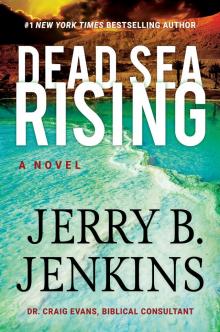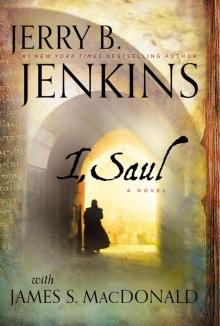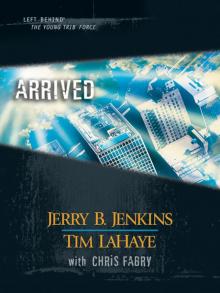- Home
- Jerry B. Jenkins
Mark's Story Page 9
Mark's Story Read online
Page 9
But Philip also reported to the apostles that a certain man named Simon, who had previously practiced sorcery and astonished the people of Samaria, had gained a following who claimed, “This man has the great power of God.” But when Philip preached concerning the kingdom of God and Jesus Christ, both men and women were baptized, and this Simon also believed and was baptized. He began to follow Philip and was amazed at the miracles and signs.
The apostles at Jerusalem urged Peter and John to go to Samaria to pray for the new believers that they might receive the Holy Spirit. When they returned, Peter gave an account to Mark and Barnabas that they had laid hands on the people and that the people had received the Holy Spirit.
“But this Simon,” Peter said, “the former sorcerer, offered us money, saying, ‘Give me this power also, that anyone on whom I lay hands may receive the Holy Spirit.’
“I told him, ‘Your money perish with you, because you thought that the gift of God could be purchased with money! Your heart is not right in the sight of God. Repent therefore of this your wickedness, and pray God that the thought of your heart may be forgiven you. I see that you are poisoned by bitterness and bound by iniquity.’
“And Simon said, ‘Pray to the Lord for me, that none of the things which you have spoken may come upon me.’”
OVER THE NEXT FOUR years such accounts made Mark want to be a true disciple, traveling and spreading the Gospel, but his mother would have none of it. “You are still but twenty years old and have much to learn, and I need you here.”
“But Barnabas wants to do the same. Let me go with him if he is assigned.”
“No! He is older and can choose for himself whether this is the life for him. You have many years ahead of you.”
After this Mark pulled Peter aside and confided in him, “One day I would love to go with you when you are out and about teaching and preaching the things of God.”
“God may just call you to such a ministry,” Peter said. “When you are older, of course.”
“You sound like my mother.”
Peter smiled and put a hand on Mark’s shoulder. “A wise woman.”
“What I really long to hear, Peter, are your memories of Jesus. I met him only months before He died, but you knew Him three years. What was it like, being with Him from when first He began performing great signs and wonders?”
Peter’s eyes seemed far away. “The miracles were one thing,” he said. “But the teaching…Our times together, just listening to Him tell us of God and of Heaven, of the kingdom.”
“You must write all that, Peter. The world must know.”
“We are telling more and more every day.”
“But it must be recorded.”
“Mark, you know I am not a man of letters. That work is for a scholar, which you are becoming.”
“But the account must be directly from an eyewitness like yourself.”
“There were many others.”
“Then they should write too. If I were able to travel with you, I could help.”
Peter returned his gaze and grinned. “Always conniving to get your way. I shall leave it to you to talk your mother into this scheme. I daresay she requires your presence here for a few more years. Anyway, before I become a historian, we have pressing duties with all these new believers, not to mention our most devoted opponent.”
“Saul.”
“Saul of Tarsus,” Peter said. “He seems full of the devil, more determined than ever to destroy us and everything we believe and teach. And with the Jews and Romans behind him, he seems to have all the authority he needs. We have just learned that he is still threatening to murder all disciples of the Lord. Word is that he has gone to the high priest and asked for letters from him to the synagogues of Damascus, so that if he finds any Christian believers there, men or women, he might bring them bound to Jerusalem. We must pray for this man.”
“Pray for him?” Mark said.
Peter seemed to study John Mark. “We don’t get as much time together as we once did, do we?”
“I didn’t think you noticed.”
“I noticed. Of course I have been busier than ever, but frankly you have seemed more interested in the activity than in true devotion to the cause.”
Mark was stunned. “I apologize if I have left that impression. It does not represent how I truly feel. I long to know more of the Master’s teaching. But I know how busy you are.”
Peter pointed to a bench inviting Mark to sit, and took a seat beside him.
“The Lord taught us to pray for our enemies, and I cannot think of anyone who better embodies that description than this Saul. Your cousin tells me the man was born a Jew and studied with him under Gamaliel to become a Pharisee. He has Roman blood on his father’s side. In short, he is uniquely qualified to counter the work of Christ and seems utterly determined to do so.”
“And yet we are to pray for him? I should think we ought to pray against him.”
“Well, of course, we pray for protection from him and that his schemes will fail. But Jesus would tell us that God loves Saul in spite of his sins and that we ought to pray for his soul. Imagine him as a believer.”
“Talk about a miracle!”
“No more so than you or I becoming followers of the Lord, John Mark. We are but—”
“Mere men, I know.”
“Try it, son. Try praying for the enemy. Pray for Saul.”
PHILIP AND MANY OF the others eventually returned to Jerusalem, where they preached the gospel in many villages of the Samaritans. One day Philip told Peter this story in Mark’s hearing:
“An angel of the Lord spoke to me, saying, ‘Arise and go toward the south along the road which goes down from Jerusalem to Gaza.’ So I went to the desert, and behold, a man of Ethiopia, a eunuch of great authority under Candace, the queen of the Ethiopians, who had charge of all her treasury and had come to Jerusalem to worship, was returning in his chariot. The Spirit told me, ‘Go near and overtake this chariot.’
“So I ran to him and heard him reading the prophet Isaiah. I said, ‘Do you understand what you are reading?’
“He said, ‘How can I, unless someone guides me?’ And he invited me to sit with him. The Scripture he read was this:
“‘He was led as a sheep to the slaughter; and as a lamb before its shearer is silent, so He opened not His mouth. In His humiliation His justice was taken away, and who will declare His generation? For His life is taken from the earth.’
“The eunuch said, ‘I ask you, of whom does the prophet say this, of himself or of some other man?’
“Well, as you can imagine, beginning with that Scripture, I preached to him, explaining that the passage clearly refers to Jesus of Nazareth, the Son of God, who was slain for our sins.
“He was immediately persuaded, and as we traveled down the road, we came to a body of water. And the eunuch said, ‘What hinders me from being baptized?’
“I told him, ‘If you believe with all your heart, you may.’
“And he said, ‘I believe that Jesus Christ is the Son of God.’
“After I baptized him and we came up out of the water, the Spirit of the Lord caught me away so that the eunuch saw me no more. The Lord brought me to Azotus, where I preached, likewise in all the cities till I came to Caesarea.”
Mark marveled at this and many other dramatic stories of the miracles of God and the mighty acts of the apostles. He despaired over having to wait and burned with longing to travel with these great men of God.
THREE YEARS LATER
{SEVEN YEARS SINCE THE CRUCIFIXION}
TWELVE
I just feel it, Mother,” Mark said one evening after a rare quiet dinner with only her. He was now well into his twenties. “It’s as if the Lord Himself is making it impossible for me to sit still. I simply have to get going and do the work the disciples are doing.”
“John Mark, I am pleased that you seem so earnest in your faith, and you know I share your belief in Jesus as the Messiah. But though
you are no longer young, you are nowhere near finishing your studies.”
“Mother, few of the disciples are learned men. Their passion, and the Holy Spirit, seem all they need.”
“They are men of age now. And they too would tell you to take care of your widowed mother awhile longer and continue to prepare yourself for a life of service.”
Mark had wearied of the discussion, which always seemed to end where they had ended the last time. In truth he was frustrated that his eagerness alone could not sway his mother. But deep inside, he feared she was right. What if he got out there on a missionary trip and grew homesick? He couldn’t imagine it, but he would then become a burden to the very men he admired and wanted to help.
Perhaps what bothered Mark most was that his cousin Joses, now known to all—even his aunt Mary—as Barnabas, had clearly been accepted by the others as a fellow disciple. His opinions were sought and valued. And, sure, he was an adult as they were, but Mark believed himself every bit as knowledgeable about the Scriptures as Barnabas. And while he had never been tested as a preacher or as an evangelist, neither had Barnabas. He detected jealousy in his own heart, but he believed his motive for wanting to join the disciples was pure.
Rhoda, a servant girl assigned to the front gate, interrupted Mark and his mother. “Master,” she said, “your cousin approaches.”
Mark hurried to welcome Barnabas and wash his feet.
“Is Peter here? And the others?”
“They are not,” Mark said. “You seem to have news.”
“It is your great fortune they are not here to hear it first,” Barnabas said, eagerly accepting a large cup of water. “You will not believe what I have to tell you.”
“Then don’t delay.”
“You know Saul?”
“Barnabas! We all know Saul, though he seems to have disappeared for years. What of him?”
“He has become a believer.”
“A believer in what? Rome? He was already that.”
“John Mark, if he is to be believed, he has become one of us, a follower of Christ.”
“Impossible. I don’t believe it.”
“As I predicted you wouldn’t. But never say anything is impossible. What kind of evangelists would we be if we believed that?”
“How do you know this? Where did you hear it? From his own lips?”
“No, I have never met him, but the news is spreading quickly that three years ago he went from persecuting Christians to preaching Christ. Word from Damascus and elsewhere is that he was holding forth in the synagogues there, arguing that Jesus is Christ, the Son of God and the Messiah. The Jews were confounded and were heard to say, ‘Is this not he who destroyed those who called on this name in Jerusalem, and has come here for that purpose, so that he might bring them bound to the chief priests?’”
“Barnabas, if this is true, it is a miracle of God!”
“Of course it is. And I intend to find out for myself.”
“How?”
“Rumor has it that he is on his way to Jerusalem to meet with Peter. I intend to intercept him and ask him for myself. If someone Peter trusts does not vouch for such a man, Peter would never agree to meet with him anyway.”
“But if it is a false report, you will be in danger.”
“John Mark, surely after all this time you know that we need fear no man.”
NOT MANY DAYS LATER, when Peter and James were in the upper room, Barnabas arrived at Mark’s door with Saul himself in tow. Though older, of course, he appeared as Mark had remembered him at the sight of Stephen’s stoning—small, dark, and intense.
“I have heard much about you, John Mark,” he said, “and I greet you in the name of Jesus the Christ.”
Mark found himself cordial but noncommittal, and after the men had been offered water to drink and had their feet washed, he led them to the upper room. Saul did not seem surprised at the guarded response from Peter and James. They bade him sit, but neither offered a hearty greeting or even a smile.
“You were an accomplice to the stoning of our friend,” James said.
Saul responded, “And many more you know not of, to my abject shame.”
“What business brings you to us?” Peter said.
Barnabas interrupted. “This eloquent and learned man is more than capable of speaking for himself, but he is here under my sponsorship, since I believe that you should hear from his own mouth the story of his encounter with God.”
“We see you as the enemy of God,” Peter said.
“And that I was,” Saul said, “the chiefest of sinners. But now I beg your indulgence.”
Peter nodded, and Saul began.
“Three years ago you may know I was on my way to Damascus, intending to root out believers in Christ and have them arrested. As you well know, I had been successful in doing this here in Jerusalem, and I had the authority, from the Pharisees and the Romans, to do the same throughout the region. But as my party and I traversed the road, suddenly a light shone around me from heaven. I fell to the ground and heard a voice saying, ‘Saul, Saul, why are you persecuting Me?’
“I said, ‘Who are You, Lord?’
“And the Lord said, ‘I am Jesus, whom you are persecuting. It is hard for you to kick against the goads.’”
Mark could remain silent not longer. “Excuse me, sir, but you’re saying Jesus Himself spoke to you from heaven?”
“I am, young man. Trembling and astonished, I said, ‘Lord, what do You want me to do?’
“The Lord said, ‘Arise and go into the city, and you will be told what you must do.’
“The men who journeyed with me stood speechless, hearing a voice but seeing no one. I arose from the ground, but when I opened my eyes I was blind! My friends led me by the hand into Damascus, where for three days I stayed at the house of a friend named Judas on the street called Straight, and I was without sight, and neither ate nor drank.”
Mark could only imagine. He himself might have lost his appetite forever.
“There, as I was fervently praying, the Lord gave me a vision of a man named Ananias coming in and putting his hand on me, so that I might receive my sight. Who should appear at my door but a man named Ananias, who told me this incredible story. He said the Lord had spoken to him in a dream and told him to go to the street called Straight and inquire at the house of Judas for one called Saul of Tarsus, ‘for behold, he is praying and in a vision he has seen a man named Ananias.’”
Peter and James looked as astonished as Mark felt. As bizarre as this was, it was just like something God would do.
Paul smiled. “Ananias told me that he answered the Lord, saying he had heard from many about me and how much harm I had done to the saints in Jerusalem. He even told the Lord that he knew I had authority from the chief priests to bind all who call on His name. But he said the Lord told him, ‘Go, for he is a chosen vessel of Mine to bear My name before Gentiles, kings, and the children of Israel. For I will show him how many things he must suffer for My name’s sake.’”
“Pardon me again, sir,” Mark said, feeling Peter’s glare and knowing he should hold his tongue. “But did you mean to say that the Lord told this Ananias that you were to bear His name before Gentiles?”
Saul narrowed his eyes at Mark. “And kings. If you think that astonishes you, imagine how I felt. Before the children of Israel I could understand, but I confess I was as worried about the ‘suffering for His name’s sake’ part. If I had to endure what I had inflicted on Christ’s followers—fair and just as that may be—I had a hard road ahead. But, brothers, Ananias laid his hands on me and said, ‘Brother Saul, the Lord Jesus, who appeared to you on the road as you came, has sent me that you may receive your sight and be filled with the Holy Spirit.’ And immediately there fell from my eyes something like scales, and I received my sight at once, arose, and was baptized.”
Mark stole a glance at Peter, who raised a brow as if to remind his young charge that they had prayed for just this possibility.
&nbs
p; “When I had eaten, I was strengthened. I spent several days with the disciples at Damascus, who immediately believed my report. They allowed me to preach Christ in the synagogues, that He is the Son of God. Everyone seemed amazed, for they knew who I was and who I had been. But I increased all the more in strength, and confounded the Jews in Damascus, proving that this Jesus is the Christ.
“Eventually the Jews plotted to kill me. The governor, under Aretas the king, was guarding the city with a garrison, desiring to arrest me, but I was let down in a basket through a window in the wall and escaped from his hands. For the last few years I have lived in seclusion, studying and preparing for ministry.”
Mark sat shaking his head, more in wonder than doubt, but he feared Saul misunderstood.
“Gentlemen, hear me. I can only imagine your skepticism, and I cannot blame you. I was one who once had confidence in the flesh, and if anyone else thinks he may have confidence in the flesh, I more so: circumcised the eighth day, of the stock of Israel, of the tribe of Benjamin, a Hebrew of the Hebrews; concerning the law, a Pharisee; concerning zeal, persecuting the church; concerning the righteousness which is in the law, blameless.
“But what things were gain to me, these I have counted loss for Christ. Yet indeed I also count all things loss for the excellence of the knowledge of Christ Jesus my Lord, for whom I have suffered the loss of all things, and count them as rubbish, that I may gain Christ and be found in Him, not having my own righteousness, which is from the law, but that which is through faith in Christ, the righteousness which is from God by faith; that I may know Him and the power of His resurrection, and the fellowship of His sufferings, being conformed to His death, if, by any means, I may attain to the resurrection from the dead.”
Mark was struck by the articulate mind of this man. He had said so much in so few words that Mark wanted to stop him so he could rehearse them in his head. But Saul continued:

 The Betrayal
The Betrayal The Valley of Dry Bones
The Valley of Dry Bones The Minions of Time
The Minions of Time Wild Rescue
Wild Rescue Though None Go with Me
Though None Go with Me Hometown Legend
Hometown Legend The Breakthrough
The Breakthrough The Youngest Hero
The Youngest Hero Nicolae High
Nicolae High Through the Flames
Through the Flames The Brotherhood
The Brotherhood Grave Shadows
Grave Shadows The Changeling
The Changeling Shadowed
Shadowed Precinct 11 - 01 - The Brotherhood
Precinct 11 - 01 - The Brotherhood Second Chance
Second Chance Silenced
Silenced The Vanishings
The Vanishings Dead Sea Rising
Dead Sea Rising Soon
Soon The Author's Blood
The Author's Blood The Sword of the Wormling
The Sword of the Wormling Left Behind - The Kids 02 - Second Chance
Left Behind - The Kids 02 - Second Chance Haunted Waters
Haunted Waters The Underground
The Underground Mark's Story
Mark's Story Shaken
Shaken Deceived
Deceived Frantic
Frantic Riven
Riven Facing the Future
Facing the Future Stung
Stung I, Saul
I, Saul Hunted
Hunted Arrived
Arrived John's Story
John's Story Stolen Secrets
Stolen Secrets